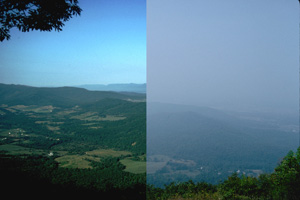Conservation Groups Challenge Weak Air Plan for Pennsylvania
Dirty air threatens public health, air quality in national parks and wilderness areas
Today, conservation groups appealed the weak air pollution requirements recently approved for the state by the Environmental Protection Agency (EPA). The groups are challenging EPA’s decision to approve Pennsylvania’s Regional Haze State Implementation Plan because it will not clean up pollution that threatens human health and natural resources in the state.

Haze in Shenandoah National Park. Good visibility on the left and poor visibility on the right.
Inadequate air pollution requirements for big polluters, chiefly coal-fired power plants, risk the public’s health and air quality at the Brigantine National Wildlife Refuge in New Jersey, Shenandoah National Park in Virginia, Dolly Sods Wilderness in West Virginia and other treasured public lands. The same pollution also harms human health, with children, pregnant women, and seniors most vulnerable.
The National Parks Conservation Association (NPCA), Sierra Club, and Clean Air Council filed the appeal with the Third Circuit of the U.S. Court of Appeals. The groups also filed a petition directly with EPA asking them to reconsider the action.
“EPA’s plan requires no pollution controls at any source—zero,” said Charles McPhedran, an attorney with Earthjustice, a non-profit law firm representing the clean air advocates. “It is unacceptable to allow large polluters to continue to dirty the air of our communities and our treasured national places. EPA must not allow air pollution in our national parks and wild lands, and in our communities.”
“Pennsylvania and EPA are required to protect places like Shenandoah National Park for our children and grandchildren,” said Cinda Waldbeusser, Pennsylvania program manager for NPCA. “Cleaning up the air is critical to ensuring our parks are unspoiled for generations to come. Residents, local business owners, and those visiting the region expect and demand no less.”
A recent court decision means that Pennsylvania’s massive coal-fired power plants are not required under other programs to reduce their emissions at all to protect parks. This plan falls far short of 35-year-old Clean Air Act protections, and will allow pollution to continue fouling air quality—affecting the health of local residents and visitors and degrading national park and wilderness resources.
“The pollutants that cause haze in our national parks are the same pollutants that contribute to heart attacks, asthma attacks and emergency room visits for asthma, chronic bronchitis and respiratory illness,” said Joe Minott of the Clean Air Council. Health related costs from hospital admissions, lost work days, and premature death are the hidden price of continued pollution.
“We should do all we can to protect these treasures, and target the major polluters instead of relying on pollutant trading that will do little to clean up the parks,” said Zack Fabish of the Sierra Club.
Source: Earthjustice
- 361 reads
Human Rights
Ringing FOWPAL’s Peace Bell for the World:Nobel Peace Prize Laureates’ Visions and Actions

Protecting the World’s Cultural Diversity for a Sustainable Future

The Peace Bell Resonates at the 27th Eurasian Economic Summit

Declaration of World Day of the Power of Hope Endorsed by People in 158 Nations

Puppet Show I International Friendship Day 2020

